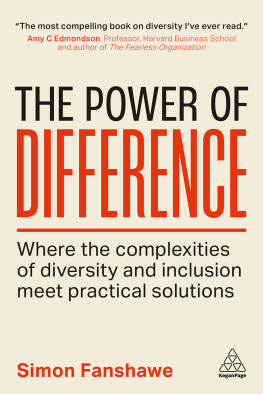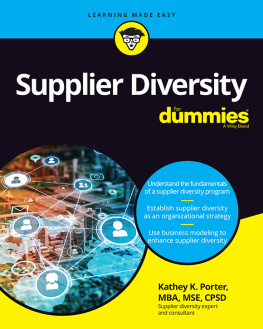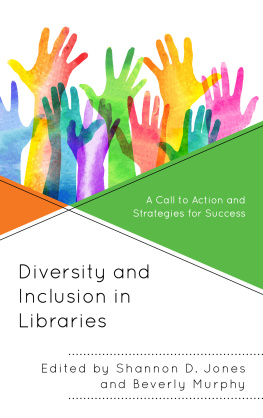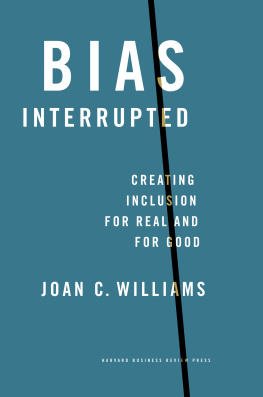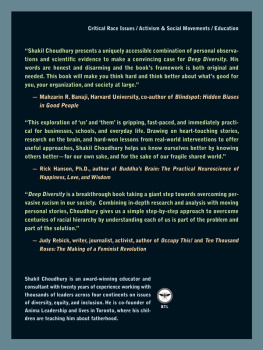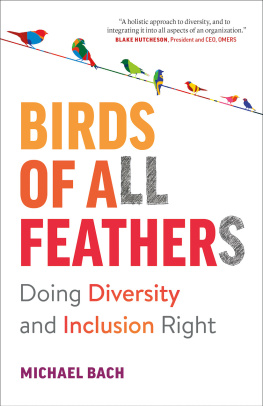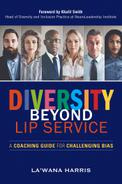Contents
Landmarks
Page List
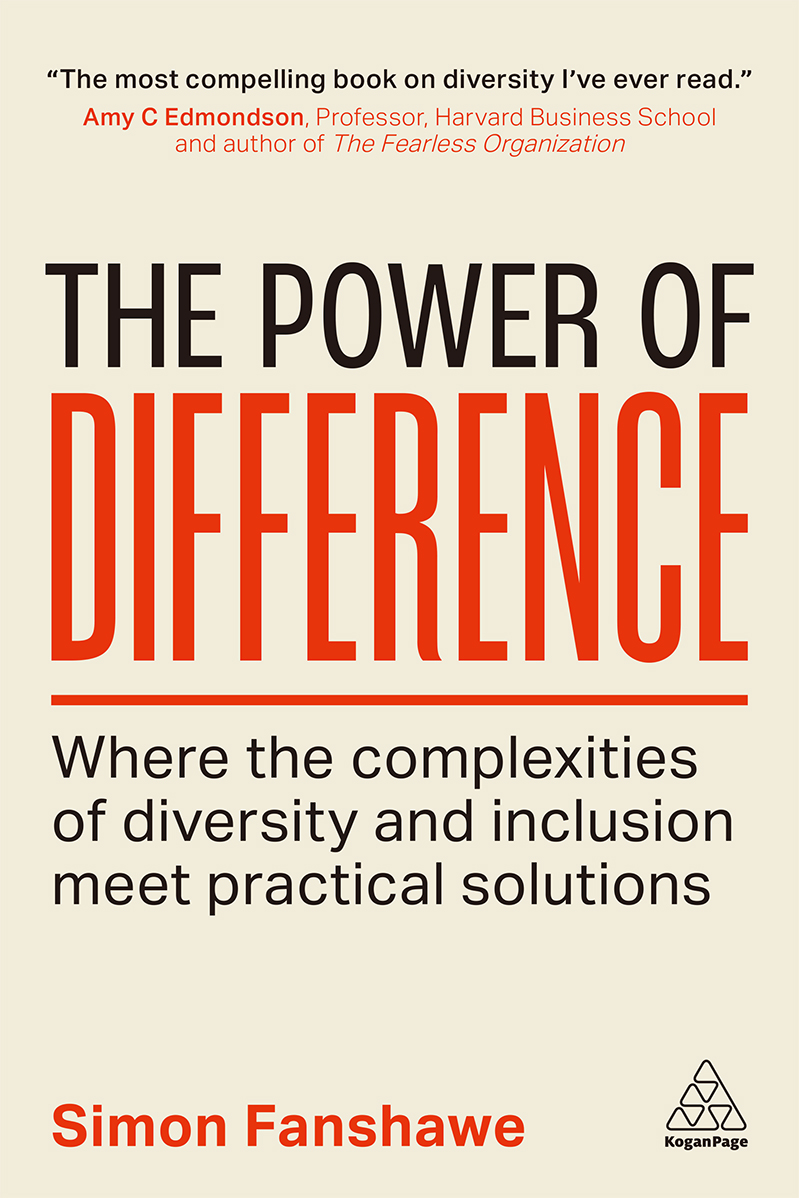
Praise for The Power of Difference
Simon Fanshawe has written the most compelling book on diversity Ive ever read. Beautifully written and full of narrative power, The Power of Difference weaves together the authors personal experiences, insights from research and remarkable stories of others journeys to show both how to build genuine inclusion and why it matters so very much in our multicultural world and to the success of organizations.
Amy C Edmondson, Professor, Harvard Business School and author of The Fearless Organization
The Power of Difference reminds us that no company can afford to let diversity and inclusion slip down the priority list. With wit and clarity, it lays out practical ways for all of us in business to attract and engage the widest range of talent in these uncertain times, in order to make our companies more innovative and profitable. I urge leaders to read it and act on its solutions.
Lord Karan Bilimoria CBE, President of the CBI and Founder and Chairman of Cobra Beer
The Power of Difference is incredibly timely. Simon Fanshawe brings wit, wisdom and challenge to pointing a way forward and how inclusion must embrace all voices. This is a call to action for every one of us to play our part in using our difference to power a better future for companies.
Peter Cheese, CEO, Chartered Institute of Personnel and Development (CIPD)
With insight, great stories and wonderful language, The Power of Difference helps all of us managers, teachers, citizens listen, truly listen, so that we can redesign how we live and work and discover the enjoyment of managing diversity along the way.
Iris Bohnet, Academic Dean of Harvard Kennedy School and author of What Works: Gender equality by design
Diversity is the life-blood of innovation. What is often missing are the practical ways to create the culture for teams to thrive, where everyone has the confidence to contribute. This is an essential part of the environment for discovery, research and implementation to flourish safely. The Power of Difference provides managers and entrepreneurs with practical insights to drive innovation, while having the rigorous discussions that engage everyones voice in assessing and taking risks.
David Gann CBE, Professor of Innovation and Entrepreneurship, Sad Business School and Chairman of the UK Atomic Energy Authority
The Power of Difference is wonderful, a remarkably enjoyable and immensely helpful read for any one in a leadership position or indeed anyone who feels the huge responsibility of improving the experience of their colleagues. The practical but powerful examples and illustrations peppered throughout the book contain the dilemmas and opportunities faced by a wide range of individuals and institutions. The golden thread was yes, the complexity but also the huge potential that exists for individuals and organizations.
Stephen Posey, CEO, The Royal Papworth NHS Trust
At the beginning and end of his wide-ranging book on the power of difference, Simon Fanshawe underscores that safe spaces should offer safety for disagreement, not from disagreement. That bracing insight is the calling card of this worthy work. In a warm and accessible manner, the book opens space to rethink diversity and inclusion efforts from first principles, including asking if diversity really is good for business, if the promises made for implicit bias can be fulfilled, and if the tone at the top matters as much as many say. I predict readers will find themselves in equally vehement agreement and disagreement with different parts of this work, but ultimately emerge feeling enriched by its many provocations.
Kenji Yoshino, Chief Justice Earl Warren Professor of Constitutional Law, NYU School of Law and Faculty Director, Center for Diversity, Inclusion, and Belonging
The Power of Difference both acknowledges the complexity in working on diversity and inclusion and then suggests really practical ways through. I simply loved it and the way it was written.
Geeta Nanda OBE, CEO, Metropolitan Thames Valley Housing
The Power of Difference
Where the complexities of diversity and inclusion meet practical solutions
Simon Fanshawe

Contents
This book wouldnt have happened were it not for several groups of people.
The women, the lesbians and gays and the friends from wholly different social backgrounds who I met through university and community politics and who generously gave me a really hard time about class and feminism and, frequently to my great discomfort, opened my eyes to their life experience.
The writers and doers whose rigour and research have so inspired material progress on diversity and the transformation of organizations: Iris Bohnet, Chris Brink, Jim Collins, Jennifer Eberhardt, Amy C Edmondson, Martin N Davidson, Scott E Page and the late Katherine Phillips.
The writers whose clarity always shines a light and raises the challenging questions: Ta-Nehisi Coates, Caroline Criado Perez, Atul Gawande, Doris Kearns Goodwin, Adam Kingl, Kenan Malik, Adolph Reed, Adam Rutherford, Sathnam Sanghera, Matthew Syed and Kenji Yoshino.
The friends and colleagues who read and commented on parts of the text, giving it direction as it blundered through its various iterations: Rantimi Ayodele, Kate Dodsworth, Jilly Forster, Hannah Jordan, Bryony Mortimer, Holly Phillips, Jesse Singal, Kathleen Stock and Kate Varah.
To Jo Berry and Jacqui Gavin whose choices and the way they live them out in the world inspire.
And particularly to my old university friend, Frances Howie, my one-time history teacher and remarkable expert on conflict resolution, Oliver Ramsbotham, and my partner in business, long-standing friend, fellow performer and ever gentle challenger, Roy Hutchins. Each of them showed me how to open up the text to transform assertions with which to disagree into invitations to debate and discuss.
And to my husband, to whom I dedicate the book, whose encouragement is constant, whose belief in my possibility is disarmingly certain and who is the power of difference in my life.
To my lovely husband, who is the power of difference in my life
It is hardly possible to overrate the value of placing human beings in contact with persons dissimilar to themselves, and with modes of thought and action unlike those with which they are familiar Such communication has always been one of the primary sources of progress.
John Stuart Mill in Principles of Political Economy
(Mill 1846, vol 2, book 3, chapter 7, section 5)
Who am I and why this book?
Before we start, I feel the need to explain what this book is. And what it isnt.
Its written by a diversity professional me aimed at people whose work or curiosity intellectual, personal or political draws them into thinking about diversity. Thats you. But its not Ten Easy Steps to Diversity in Business. Its not Inclusion Made Easy. In fact, rather the opposite. If anything, its about pointing out just how incredibly difficult the whole field of diversity and inclusion is. But theres optimism in here because, no matter how difficult, there is nothing more satisfying than making honest interaction between people and their differences flourish in order to achieve great things. Which is ultimately the point.

